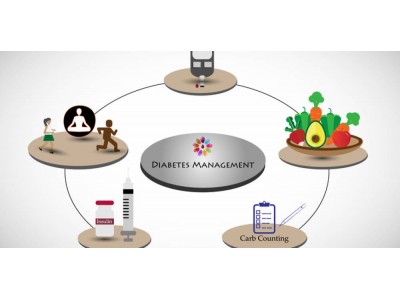Managing diabetes involves maintaining blood sugar levels within a healthy range to prevent complications. This typically involves a combination of lifestyle changes, medication, and regular monitoring. Here’s a brief overview of diabetes management:
- Diet and Nutrition: A balanced diet is crucial. Focus on portion control, complex carbohydrates, fiber-rich foods, lean proteins, and healthy fats. Limit sugar and processed foods.
- Regular Exercise: Physical activity helps lower blood sugar levels. Aim for at least 150 minutes of moderate-intensity exercise each week. Consult your healthcare provider before starting an exercise regimen.
- Medications: Depending on the type of diabetes, you may need oral medications or insulin therapy. Always take medications as prescribed.
- Blood Sugar Monitoring: Regularly check your blood sugar levels using a glucometer. Your healthcare provider will advise you on how often to do this.
- Stress Management: Stress can affect blood sugar levels. Practice stress-reduction techniques like deep breathing, meditation, or yoga.
- Doctor’s Visits: Attend regular check-ups with your healthcare team. They will monitor your overall health and adjust your treatment plan as needed.
- Foot Care: People with diabetes are prone to foot problems. Inspect your feet daily and seek medical attention for any issues.
- Hydration: Drink plenty of water to stay well-hydrated, which can help control blood sugar.
- Sleep: Aim for 7-9 hours of quality sleep each night. Poor sleep can affect blood sugar control.
- Education: Understand your condition and its management. Attend diabetes education classes or workshops if available.
- Weight Management: If overweight, losing weight can improve blood sugar control.
- Alcohol and Smoking: Limit alcohol consumption, and if you smoke, seek support to quit.
- Emergency Plan: Know how to manage hypoglycemia (low blood sugar) and hyperglycemia (high blood sugar) in emergencies.
Remember, diabetes management is highly individualized. Your healthcare provider will create a plan tailored to your specific needs and will make adjustments as necessary. It’s important to follow their guidance and seek help whenever you have questions or concerns.
